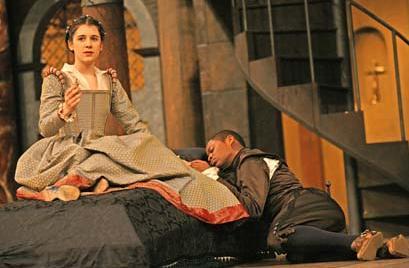Romeo and Juliet is one of Shakespeare’s good plays: sex and violence, comedy and tragedy. What else could you want? There’s even a happy ending if you forget about the broken hearts, ignore the body count and focus on the reconciliation between Olds Montague and Capulet. The good plays are paradoxically hard to stage: ghosts of productions past linger in the wings and, in this case, Baz Luhrmann’s 1996 film casts a long shadow.
There will always be something special about seeing the famous balcony scene at the Globe theatre and Dominic Dromgoole is far too experienced a director to waste time trying to ‘do something different’ with the world’s greatest love story. The key to his superb in-house Romeo and Juliet is the skill with which a versatile cast tease out all that’s already on offer in Shakespeare’s play: the verse is simply spoken and not a syllable is lost. It is very difficult not to fall in love with Adetomiwa Edun’s charismatic, glowing Romeo who almost eclipses Ellie Kendrick’s gauche, doll-like Juliet until she really comes into her own after the interval. Philip Cumbus and Ian Redford are excellent as Mercutio and Tybalt and it is further to Dromgoole’s credit that the production doesn’t sag after their deaths but remains moving for the whole of a very short three hours (even on the purgatorial wooden benches – hire a cushion, they’re only £1!).
Romeo and Juliet is often thought of as a conflict between the impetuosity of youth and the inflexibility of age but Dromgoole goes further: Old Capulet’s ungoverned fury, Friar Lawrence’s flawed scheming and even the Nurse’s indifference to bigamy are shown to be just as dangerous as Romeo’s ardour, Mercutio’s spleen or Tybalt’s rage.
In the absence of a set, the costumes and the music come into their own. The composer (Nigel Hess), working in tandem with the Globe musicians, has interwoven a fabric of atmospheric sounds and themes throughout the performance. The effect is often haunting and lends a subtle pathos to the play’s more melancholy moments when the daylight drains from the sky and the wooden O seems to warm up in the cool of evening.
There is simply no reason not to spend a night at the Globe this summer: just don’t spoil a good play by leaving your phone on.





